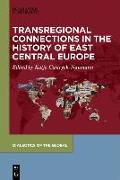Transregional Connections in the History of East Central Europe
BücherAngebote / Angebote:
Societies and politics of Eastern Europe are currently renegotiating their global entanglements and participation in international affairs in fundamental and seemingly contradictory ways. This volume aims at a deeper understanding of this process by means of historical analyses of four dimen-sions which have for long been core areas of the repositioning in the world and transformations in the region. At the same time it seeks to make a conceptual contribution to the new field of stud-ies examining the transregional connections in the history of East Central Europe.
Despite the increasing interest in exploring the global connectedness of the region and in developing comparative questions, the literature on the subject is scattered and fragmented across different disciplines. Complicating the matter, Eastern Europe has for long been studied with normative preconceptions and imaginations that are grounded in dominant theories on international relations, modernization and development which are deeply influenced by conceptual Eurocentrism and methodological national-ism. Examples of such normative assumptions are that the region exists sui generis or that its trajectory is determined by an alleged lateness in modernization processes and unfavourable geopolitical posi-tion. There is the danger that these notions are (implicitly) reproduced in the efforts of globalizing our understanding of the region. Linked to that, we are confronted with opposing narratives in terms of the capacity of East Central European actors to transnationalize and transregionalize their agendas and activities. For example, in cultural and scientific domains often longstanding and seemingly persistent ties within and across the region are highlighted, while for the participation in international organisa-tions mostly a limited scope of action is attested due to the fact that sovereign nation-states had an ambivalent fate.
All together, the volume presents source-based insights on the role of transregional connections in the history of East Central Europe in four dimensions of past and present positioning in the world with the aim to contribute to deeper understanding of how societies in the region responded to the global condi-tion, that is how they transformed their political orders by ways of integrating in cross-border and transregional connections and constellations.
Erscheint im November




